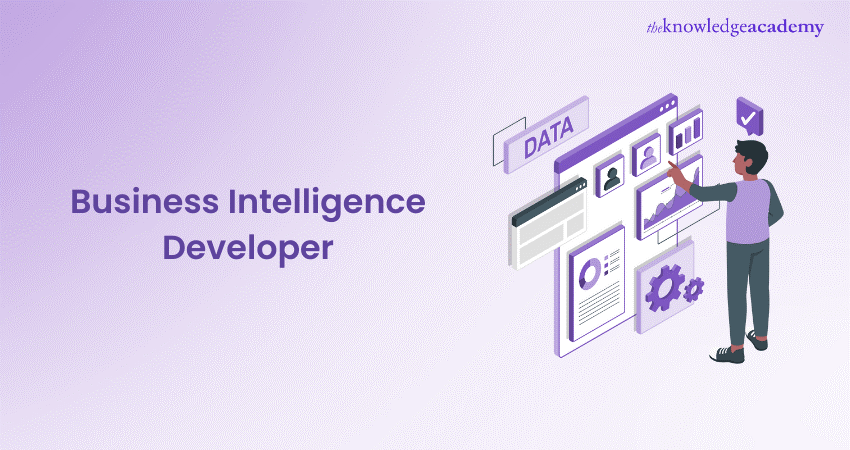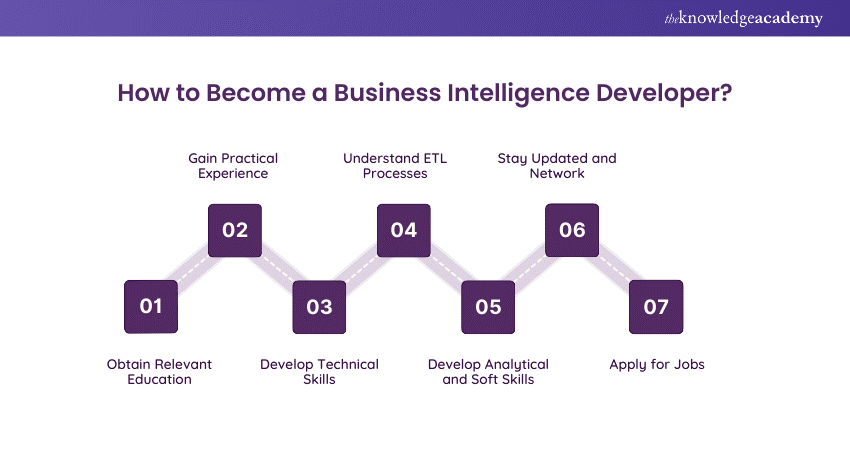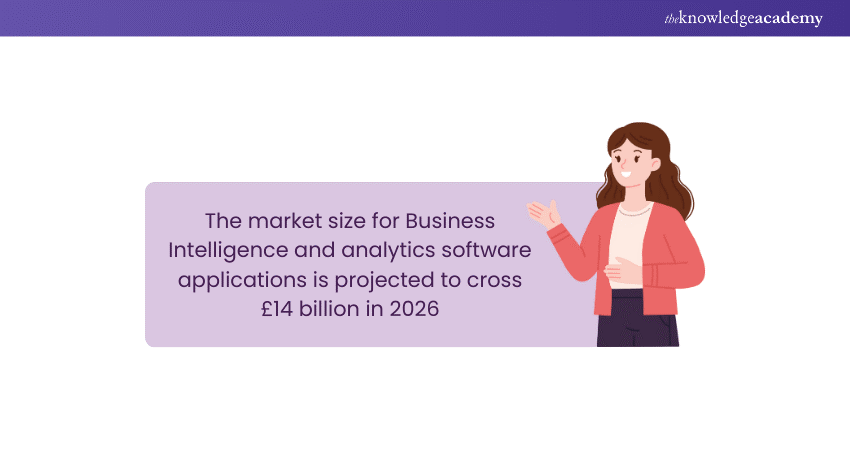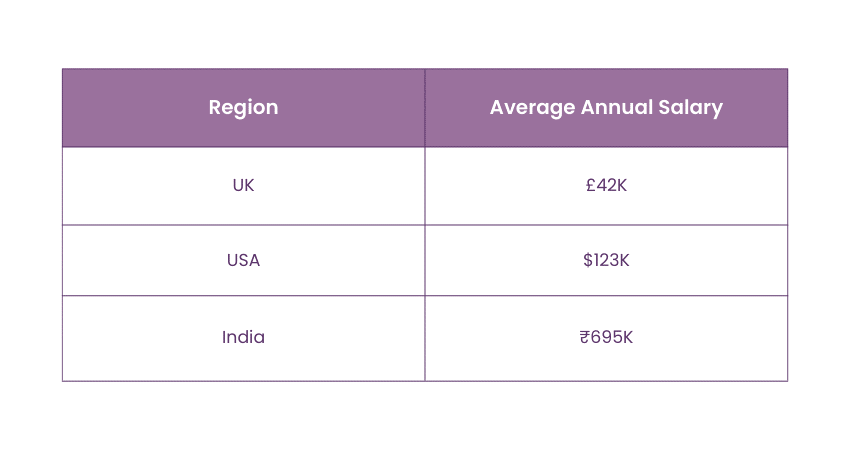We may not have the course you’re looking for. If you enquire or give us a call on 01344203999 and speak to our training experts, we may still be able to help with your training requirements.
Training Outcomes Within Your Budget!
We ensure quality, budget-alignment, and timely delivery by our expert instructors.

The modern digital world is a chaotic sea of data that impacts every industry. In this data-heavy business environment, a Business Intelligence Developer plays the key role of transforming waves of raw data into smooth, insightful currents that steer businesses toward success. From Data Analysis and reporting to building dashboards and troubleshooting issues, Business Intelligence (BI) Developers handle a dynamic range of responsibilities.
If you are envisioning such a career path, this blog will shed light on everything the role of a Business Intelligence Developer entails, including the essential skills and the steps to become a BI pro. So read on, turn complex data into digestible stories and empower businesses to perform with precision.
Table of Contents
1) Who is a Business Intelligence Developer?
2) Business Intelligence Developer Roles and Responsibilities
3) How to Become a Business Intelligence Developer?
4) Business Intelligence Developer Skills
5) Business Intelligence Developer Salary
6) Conclusion
Who is a Business Intelligence Developer?
A Business Intelligence Developer is a software engineer specialising in developing, deploying, and maintaining BI interfaces, including Data Analytics, Data Visualisation tools, and reporting software. Their work involves transforming data into insights that drive business decisions. These developers are critical in increasing business efficiency and productivity by providing the most current and relevant data for decision-making processes.
Business Intelligence Developer Roles and Responsibilities
BI Developers handle many responsibilities, including the following:
1) Creating and implementing BI software and systems, including data warehousing and database integration.
2) Developing dashboards, reports, and visualisations to present complex data in an actionable format.
3) Building and maintaining data models to ensure data accuracy and managing database performance, security, and integrity.
4) Overseeing data transformation, extraction, and loading from various sources into usable form for business analysis.
5) Working closely with stakeholders to gain insight on their data needs and translating business requirements into technical solutions.
6) Performing regular maintenance and updates to existing BI solutions to incorporate new data sources or analytics capabilities.
7) Implementing data governance policies and practices.
8) Staying ahead of the latest trends and technological updates in BI, Data Analytics, and Data Visualisation to improve BI capabilities continuously.
Want to master the art of interpreting and presenting complex data effectively? Sign up for our Business Intelligence Analyst Course now!
How to Become a Business Intelligence Developer?
Pursuing a career path of a Business Intelligence Developer entails a balanced combination of academic learning, skill development, and hands-on experience. Here's a step-by-step look into entering this dynamic field

1) Obtain Relevant Education
Begin with a bachelor's degree in a relevant field such as IT, Data Science, Computer Science, or Business Information Systems to build a solid foundation of the key concepts and technologies used in BI development. Also, consider taking courses specific to Data Analytics, BI, Data Modelling, and Database Management. Certifications can also increase your skills and make you more desirable to employers.
2) Gain Practical Experience
Apply for internships in Database Management, Data Analysis, or related areas. You can work on projects that allow you to practice BI development skills, such as database design or Data Visualisation.
Based on this, you can create a work portfolio, including any personal projects that demonstrate your ability to translate data into actionable insights. This could include reports, dashboards, or data models you have developed.
3) Develop Technical Skills
You must learn BI and Data Visualisation tools like Tableau, Microsoft Power BI, or Qlik Sense. Understanding how to use these tools to create dashboards and reports is crucial. Additionally, you must master SQL and Database Management, which will develop your database querying skills and strengthen your knowledge of Database Design and management principles.
4) Understand ETL Processes
Learn about Extract, Transform and Load (ETL) tools and processes, which are key to preparing data for analysis. Additionally, get comfortable with Data Modelling principles, including building and maintaining data marts and warehouses.
5) Develop Analytical and Soft Skills
BI Developers must have strong analytical, problem-solving and communication skills. These skills enable you to:
a) Analyse data trends and provide insights
b) Identify issues and find practical solutions under tight deadlines
c) Communicate complex data insights clearly and understandably to non-technical stakeholders.
6) Stay Updated and Network
Since the field of BI is constantly evolving with new tools and technologies, staying updated is essential. You can follow industry news, attend workshops, and participate in relevant forums and groups.
Additionally, you should connect with professionals in the field through industry conferences and sites such as LinkedIn. Networking can provide valuable insights into the BI field and open better job opportunities.
7) Apply for Jobs
Craft your resume to highlight relevant experience and skills and start applying for BI Developer positions. Don’t forget to include your portfolio and examples of projects you have worked on.

Business Intelligence Developer Skills
While different companies require different skills, there are a few essential skills that help all Business Intelligence Developers succeed. The following are the necessary skills of a BI Developer:
Communication
A great Business Intelligence Developer can explain complicated concepts to those outside the field. The information you present drives essential decisions that affect the company.
Public Speaking
After collecting data, a BI Developer must present it to the company's decision-makers. They must be prepared to speak to audiences and respond to their queries to explain the data effectively.
Problem-solving
A Business Intelligence Developer must be able to troubleshoot technology and find solutions for the problems they identified. For example, if they detect any failure in data recording, they must be able to develop a new tool or query to expedite the process.
Attention to Detail
When analysing data, a Business Intelligence Developer must identify telling information about the business. Such information can include noticing trends in the data that influence customer retention and sales revenue. A BI Developer's analysis is vital since they use mathematical evidence to explain their findings.
Collaboration
A BI Developer often has to work with other specialists. They must be able to collaborate with others to deliver comprehensive results from vast data sets.
Learn how to generate interactive reports and dashboards through a wide range of visualisations in our comprehensive Microsoft Power BI Course - Register now!
Business Intelligence Developer Salary
The salary of a Business Intelligence Developer can vary based on location, experience, industry, and the tools they use. Here's a breakdown of the average annual salary of a BI Developer across three major regions

Source: Glassdoor
Conclusion
In conclusion, a Business Intelligence Developer serves as the backbone of data-driven decision-making. Their analytical and problem-solving skills transform raw data into actionable insights and help organisations to stay competitive. Mastering the skills and responsibilities detailed in this blog will help you excel in the evolving field of Business Intelligence.
Want to understand how to connect, blend and clean diverse data sources? Our up-to-date Tableau Desktop Training will help you – Sign up now!
Frequently Asked Questions

The four main components of Business Intelligence are:
a) Data collection and integration
b) Data Analysis
c) Data Visualisation
d) Reporting and dashboards

The main technique of Business Intelligence is Data Analysis, which involves Data Mining and Data Warehousing.

The Knowledge Academy takes global learning to new heights, offering over 30,000 online courses across 490+ locations in 220 countries. This expansive reach ensures accessibility and convenience for learners worldwide.
Alongside our diverse Online Course Catalogue, encompassing 19 major categories, we go the extra mile by providing a plethora of free educational Online Resources like News updates, Blogs, videos, webinars, and interview questions. Tailoring learning experiences further, professionals can maximise value with customisable Course Bundles of TKA.

The Knowledge Academy’s Knowledge Pass, a prepaid voucher, adds another layer of flexibility, allowing course bookings over a 12-month period. Join us on a journey where education knows no bounds.

The Knowledge Academy offers various Business Intelligence Reporting Courses, including the Business Intelligence Analyst Course and the Microsoft Power BI Course. These courses cater to different skill levels, providing comprehensive insights into What is Business Intelligence (BI).
Our Office Applications Blogs cover a range of topics related to Business Intelligence, offering valuable resources, best practices, and industry insights. Whether you are a beginner or looking to advance your Business Intelligence skills, The Knowledge Academy's diverse courses and informative blogs have got you covered.
Upcoming Office Applications Resources Batches & Dates
Date
 Business Intelligence Analyst Course
Business Intelligence Analyst Course
Fri 24th Jan 2025
Fri 28th Mar 2025
Fri 23rd May 2025
Fri 25th Jul 2025
Fri 26th Sep 2025
Fri 28th Nov 2025







 Top Rated Course
Top Rated Course



 If you wish to make any changes to your course, please
If you wish to make any changes to your course, please


